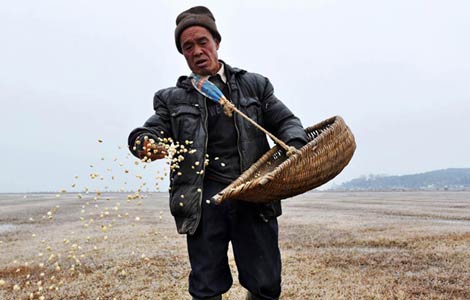

|
 |
|
A worker disinfects stalls and facilities at a live poultry wholesale market in Guangzhou on Monday. After reports of four people infected with H7N9 bird flu virus last week, Guangdong province ordered a one-day closure of live poultry markets for disinfection. Long Yuyang / China News Service |
The risk of an outbreak of the H7N9 bird flu virus is relatively low in Guangdong, despite reports of four new cases of the virus within five days last week, health experts said on Monday.
Zhang Yonghui, director of the Guangdong Provincial Disease Control and Prevention Center, expected sporadic infections of the bird flu virus in the coming months because winter and spring are the peak periods.
"Human immunity drops, and the virus is more likely to survive and spread in low temperatures," Zhang said.
On Monday, Guangdong ordered a one-day closure of live poultry markets across the province for disinfections.
In the latest of the four reported cases, a 38-year-old Shenzhen man tested positive for the H7N9 bird flu virus on Dec 18 and was found to have had contact with live poultry before developing a cough on Dec 9.
The man, surnamed Ou, was in a serious condition on Monday and had been transferred to Shenzhen No 3 People's Hospital for further treatment.
"There might be some sporadic and serious human cases of the flu virus in the near future. But there won't be an outbreak of the infection between birds and people," Zhang said.
As of Sunday, Guangdong had reported six human cases of H7N9 flu virus since July — two in Dongguan, two in Yangjiang, one in Shenzhen and one in Huizhou, according to the provincial government.
Of the six patients, two people have been discharged from the hospital.
The other four patients, all of whom remain in hospitals, are senior citizens, Zhang said.
There are no new cases reported as of Monday.
The virus, which infects birds and people, has reportedly affected more than 140 people in the country, killing 45 since March, according to the National Health and Family Planning Commission.
Zhong Nanshan, an academic at the Chinese Academy of Engineering and director of the Guangzhou Institute of Respiratory Diseases, warned at a government news conference on Sunday that people should not eat unwell poultry or buy poultry from unknown sources.
"The meat must be cooked because the virus is sensitive to the high temperature. We have found that all of the cases reported in Guangdong were related to contact with live poultry," Zhong said.
"If the virus is not developed into human-to-human transmission, there is no need to worry about an outbreak during Spring Festival travel," he said.
Still, health and commercial and industrial authorities have ordered poultry markets across the province closed for disinfection on two additional days — New Year's Eve and the day before Spring Festival.
In neighboring Hong Kong, two more cases of the avian influenza A were reported in December, both imported from Shenzhen. The city has suspended three registered poultry markets that provide live chickens to Hong Kong.
Hong Kong's live poultry wholesale association told media that the city imported about 7,000 live chickens from 28 registered markets in Guangdong province and the suspensions will not affect the market demand.
Lin Jing in Shenzhen contributed to this story.







